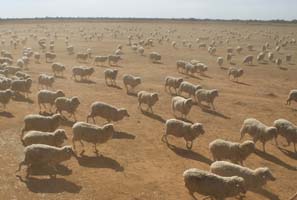
Asthma is a chronic inflammatory lung condition which causes the air ways (bronchi) of the lungs to become inflamed and narrow. The inflammation results in increased mucous production and bronchoconstriction, making it harder to breathe.
Asthma can be a life threatening condition if not treated and managed properly. It affects one in nine Australians.
Another asthma term that affects the farming community is thunderstorm asthma. People at risk for thunderstorm asthma are those that have spring-time allergic rhinitis (hayfever)/confirmed ryegrass pollen and allergy. It isn’t a specific type or diagnosis of asthma, but it is a trigger for some people and can be very serious. It can happen suddenly to people susceptible to asthma and or hay fever and if grass pollen is a problem for you then you may be at risk for a thunderstorm asthma event.
Hazards and risks for farming men, women, children and agricultural workers are high as they are exposed to irritants such as organic and inorganic dusts from pollens, animal dander, grain and hay, which can trigger asthma attacks in susceptible people. Being overweight has also been identified as a risk of developing asthma as fat tissue produces inflammatory substances that might affect the lungs.
Exposure to organic and inorganic dusts is likely to occur when working with or around:
- Stock, grain, soil, hay and silage which is being moved or transported
- Grain which is being harvested and stored
- Smoke released from burn offs or bushfires
- Pollens released from pastures, crops and trees.
The most common signs of asthma are:
- Coughing – especially at night, during exercise or when laughing
- Difficulty breathing
- Chest tightness
- Shortness of breath
- Wheezing (a whistling or squeaky sound in your chest when breathing, especially when exhaling)
There are many allergens in the agricultural workplace that may irritate and cause asthma to develop in a previously healthy person or trigger asthma symptoms in someone that already has asthma.
Recommendations and strategies to reduce your risk of developing asthma and/or having an asthma attack include:
- Limiting exposure to dust, smoke and pollens by wearing a fitted face mask
- Stop smoking
- Avoid allergens that may trigger asthma attacks
- Encourage a diet high in fruit, vegetables, wholegrains and lean protein
- Work with your employer/employees to reduce exposures to irritants/triggers on the farm
- Talk to your GP or Respiratory Nurse Practitioner about having a Spirometry (breathing test) and a written asthma management plan (also referred to as an asthma action plan).
Asthma attacks can develop over a few minutes or a few days. In an emergency situation, farming men, women, children and agricultural workers need to act quickly as they may have longer travel distances to seek medical treatment – placing them at greater health risk. For this reason it is important to have an asthma management plan in place for those individuals on the farm or workplace who are known to suffer from asthma. This plan should at least contain:
- Individual’s identified triggers
- Strategies to minimise asthma risks
- Individual’s emergency response plan including medication management (with inhalers or puffers).
In all cases, asthma becomes a medical emergency if the person finds it increasingly difficult to breathe and talk, has severe chest tightness, feels distressed and they are sucking in their throat and their ribs are retracting (pulling in).
Call triple zero (000) for an ambulance in an emergency.
To learn more about asthma emergency first aid visit Better Health Channel.
To find out more thunderstorm asthma visit Better Health Channel.
Fast facts
- Asthma is a respiratory disease that affects the small air ways of the lung. Asthma can be controlled with appropriate preventative medication (inhalers or puffers).
- Attacks can be triggered by dust, grains, smoke and pollens.
- Attacks can be prevented and managed if strategies to reduce exposures to irritants and triggers are in place.
- People with asthma who live or work on a farm should have a personal asthma management/action plan.
References used for this topic
More information:
National Asthma Council
What is asthma?
National Asthma Council
What is thunderstorm asthma?
Asthma Australia
Visit website
Clinical care:
National Asthma Council Australia
Managing acute asthma in clinical settings
Managing asthma in children
Asthma first aid
A quick reference guide for primary health care professionals (2024)
Research & reviews:
Australian Institute of Health and Welfare
Asthma in Australian children
Global Initiative for Asthma
National Asthma Strategy
|
|